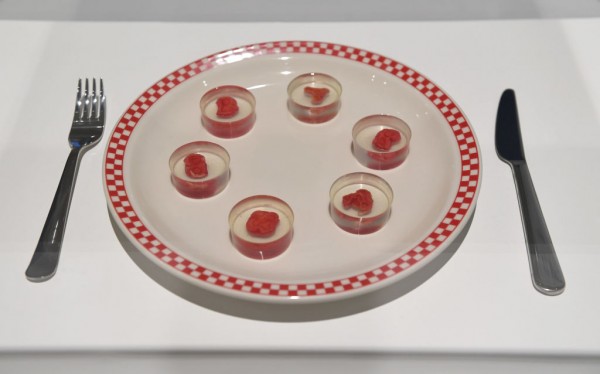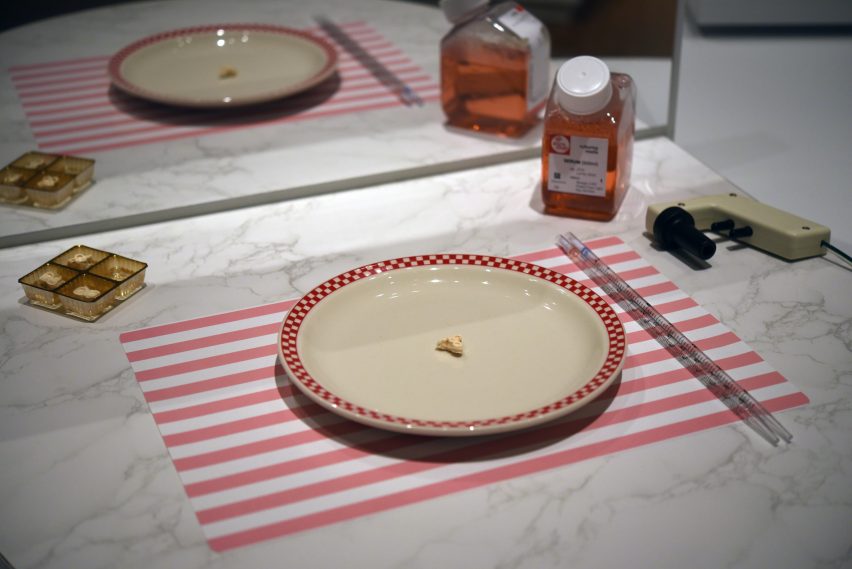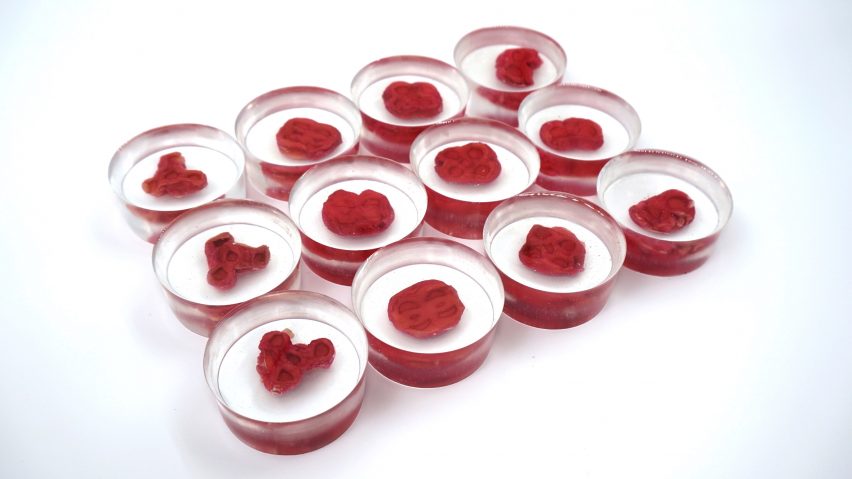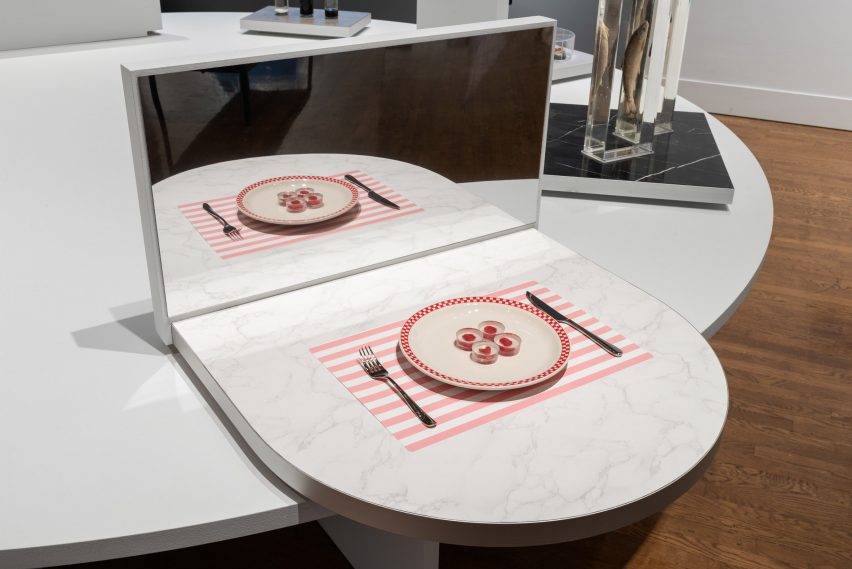Dine Out on WHAT?!!!
"The cellular agriculture industry is a very important industry -- it's a very important area of biological design. But a lot of people don't pay attention to the real costs of lab-grown meat.""There's constantly a hype cycle. We should be critical about this hype and be realistic about what's possible at any given time. And also ask people the very basic question: Why don't you just consume less meat instead of trying to replace our meat consumption with all kinds of more expensive and [less desirable] solutions?""When people are choosing between killing animals, or lab-grown meat versus plant-based alternatives, this human steak needs to be considered because it also asks us the question: How far can we go to meet our protein needs when we are running out of options?""It is a little bit combined storytelling with real, hard science [prototypes of the Ouroboros Steak installation]. But ultimately, it's about asking these questions.""We all like to think about sustainability as 'how do we survive on the planet in a longer period'? But we don't really want to take the risks or question our own assumptions. So we push by saying that, 'Well, maybe you need to eat yourself to be able to survive on the planet'.""People feel very offended. And that offence is an important place to really ask these questions.""Ultimately this project is doing its job in terms of creating this self-reflexive environment."Orkan Telham, interdisciplinary artist, designer, researcher
 |
| (Photo : Stuart C. Wilson/Getty Images) LONDON, ENGLAND - OCTOBER 20: 'Ouroboros Steak by Andrew Pelling, Orkan Talhan and Grace Knight on display during the "Beazley Designs Of The Year 2020" photocall at Design Museum on October 20, 2020 in London, England. |
"The fuzziness is actually part of the whole myth of the cannibal -- what is cannibalism and what is not.""Who is a cannibal? 'It's them, but it might be us' is part of what makes it powerful.""People have different taboos but food is just so symbolic that it's a statement about who you are, and what you believe in. It's a statement of values. And that's clearly part of the whole design [of the Ouroboros steak]."Maggie Kilgour, Olson professor of English Language and Literature, McGill University"If you wanted to grow meat in a laboratory setting, you could do it with chicken or you could do it with beef, or you could do it with fill-in-the-blank.""But the whole idea of doing it with humans is just completely absurd.""It's been ingrained in us since the time of Homer. The worst thing you can do to another person is to cannibalize them. Now tie that into Christian ideas about what you do with the dead and how at a certain point you'll be resurrected -- your body and soul will be together up in heaven. And then tie that into food, which people are all worked up about anyway."Bill Schutt, zoologist author, Cannibalism: A Perfectly Natural History
 |
| The grow-it-yourself kit would include mycelium scaffolds (centre) and human serum (right) |
Well, then ... eat yourself? Think of culturing human cells in human serum for the purpose of growing, yes, human meat. A team of scientists and designers gave birth to this concept, naming it Ouroboros Steak. But what is quite different about the concept itself is that the cells used to produce the human meat are to be grown by those intending to consume the meat, using their own body cells. They are, in effect, planning in so doing, to consume themselves in a sense; biologically that is.
The 'steak called Ouroboros Steak's conception visualizes the grower/eater using their own cheek-swabbed cells along with a blood bank by-product. The word Ouroboros refers to the ancient Egyptian symbol of a snake swallowing its own tail representing an infinite loop; the concept merges the consumer with the consumed. The conception is comprised of an art installation on display at London's Design Museum which displays four bite-sized, red morsels of flesh preserved in resin. Titled "Breakfast Before Extinction".
 |
It was featured in Dezeen, an architecture and design magazine, in mid-November where an article: "Ouroboros Steak grow-your-own human meat kit is 'technically' not cannibalism" was published, likely as an avant-garde piece. It was meant to represent a thought experiment explained Mr.Telhan; a critique of lab-grown meat whose purpose was to initiate a discussion, not necessarily to present as a possible solution for proteins to reach a market niche. Lab-cultured meat is often thought of as 'clean meat', slaughter-free meat production, more environmentally friendly than conventional livestock agriculture.
On the other hand, a startup, Aleph Farms based in Israel whose concept was released in 2018, appears to be approaching commercial product realization after launching its program to grow steaks in space earlier this month. It revealed its thin-cut prototype at the Asia-Pacific Agri-Food Innovation Summit held in Singapore on November 20. SuperMeat, yet another Israeli company, is in the process of trialling cultured chicken burgers at a new restaurant in Tel Aviv.
 |
| For display, the bite-sized steaks are preserved in resin |
The Ouroboros Steak creators highlight the use of fetal bovine serum (FBS) used by the cultured meat industry. This is a frequently used ingredient in a wide range of fields, including lab-grown meat, biotechnology research and vaccine production where FBS is harvested from living fetal calves, through a puncture to the heart without the use of anesthesia -- during the slaughter of pregnant cows. Incentives for a replacement ingredient are led not by ethical concerns but by the cost; 400mL of FBS sells for $1,084.
"While many commercially available growth media are free of the decidedly non-vegan fetal bovine serum, they have all been judged to be too expensive for use at industrial scale" writes Genjamin Aldes Wuirgaft in Meat Planet: Artificial Flesh and the Future of Food. Some lab-grown meat companies including Aleph Farms, Moss Meat in the Netherlands and Tiftek out of Turkey report they no longer use FBS for production. Mr. Telhan, on the other hand, doesn't visualize the FBS issue being resolved yet.
It took three months for the prototypes for the Ouroboros Steak installation to mature, and there are no plans to commercialize the project. Its creators felt no compulsion to taste what they had created. Critics of the concept have equated the Ouroboros Steak with autocannibalism. A word that has been loosely used, cannibalism has been replaced by some anthropologists with the word anthropophage; 'people eater'. What is clear is that civilized societies view cannibalism with revulsion.
The word ouroboros was a symbol of renewal in antiquity. Greek and Roman magical practices adopted from ancient Egypt exemplify the concept with the name combining the Greek oura (tail) and boros (devouring or gluttonous).
 |
| Ouroboros Steak was previously exhibited at the Designs for Different Futures exhibition at the Philadelphia Museum of Art |
"[In Greek and Roman mythology, cannibalism marks a] final, ultimate transgression.""It's resisting these ideas of autocannibalism as a taboo by labelling it as something that is a symbol of rebirth and regeneration.""It really raises questions about the morality of meat-eating and what lengths we should go to to avoid eating other animals -- and so eating yourself.""It's not really cannibalism when you think about it as this ouroboros ... it's using yourself to regenerate. And in that sense it's like an infinite cycle of life and rebirth and regeneration, instead of this horrific killing and end of life that we get when we eat other animals."Rebecca Moorman, course lecturer on Horror and the Grotesque in Ancient Rome, University of Toronto, Mississauga
Labels: Cannibalism, Human Cells Cultivation, Laboratory-Meat, Parody

0 Comments:
Post a Comment
<< Home